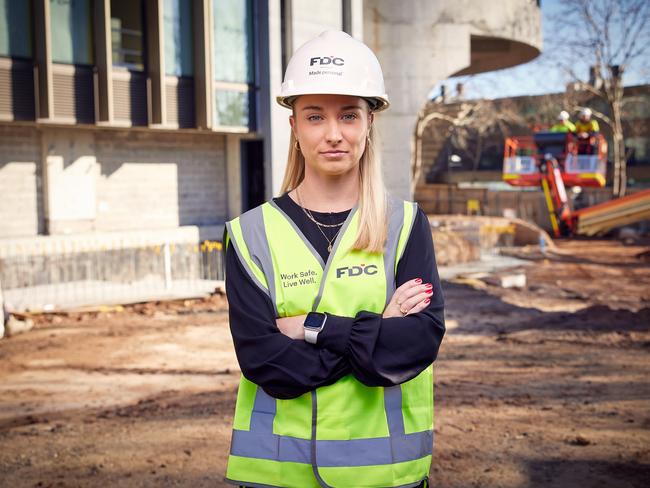CFMEU not representative of the sector, Australian building industry says to would-be workers
The controversial building workers union is not representative of the whole sector, industry leaders say, urging Aussies to consider the well-paid and rewarding careers on offer.
Careers
Don't miss out on the headlines from Careers. Followed categories will be added to My News.
The building industry is begging Aussie job seekers not to abandon construction careers, saying the highly publicised undesirable behaviour within the CFMEU is not representative of the entire sector.
Industry experts concede allegations of criminal activity by the building workers’ union have damaged efforts to attract more construction workers. But they maintain the sector still offers the best option for those seeking a well-paid and rewarding career.

The work environment has significantly improved since an external administrator was appointed to the CFMEU, says Master Builders SA chief executive officer Will Frogley, with the sector now pushing several initiatives to attract and retain employees.
But the harm caused by damning claims of bullying, corruption and infiltration by outlaw motorcycle gangs still lingers in a sector that needs a staggering 486,000 new workers to address the nation’s housing shortage and keep public infrastructure projects on track.
“(The effect the CMFEU scandal has had on recruitment) is obviously hard to quantify but … it has scared people off,’’ Frogley says.
“Women are especially turned off. I don’t think women want to work in an area where there’s thuggery, intimidation and bullying.
“It’s influenced parents as well. Parents want to see their kids in a highly paid, fulfilling career – not something with alleged links to bikies and organised crime.’’
Focusing on the positives
Industry groups and employers are committed to improving the reputation of the construction sector, which still holds plenty of promise for a fulfilling career, Frogley says.
“If you want a well-paid career, a rewarding career, where you will be in demand for many years to come, it will be hard to find anything better than building and construction,’’ he says.
Australian Constructors Association chief executive officer Jon Davies agrees, and says there are ample career opportunities for those wanting to work on the tools or take on a white-collar support role.
“It would be foolish to say there hasn’t been some damage to the industry (by the CMFEU saga) but … as an industry, we have got so many good things going for us,’’ Davies says.
“The (allegations of) bullying and harassment and coercion (involved) a relatively small amount of the overall workforce.
“While they’re very grave and serious issues, to suggest that they are issues that apply right across the industry would be incorrect.’’
Several initiatives started well before the CFMEU allegations were made public – including the 2018 establishment of a taskforce to improve the culture of the construction industry – will now receive greater prominence, Davies says.
There will also be renewed emphasis on attracting more workers to the industry, including a program starting next year targeting mid-career women, he says.
“We think there are masses of opportunities for mid-career women to transition into really well-paid, really interesting (and) rewarding roles in construction,’’ he says.
He believes the industry must counter common perceptions that all construction jobs require workers to pick up the tools, saying the demand for white-collar professionals is huge.
“The support requirements for large construction jobs are enormous,’’ Davies says.
“There’s many, many roles that don’t involve having to pull your boots on and go to a construction site.’’
Making a difference
Award-winning builder FDC is among those committed to making the construction sector more inclusive and attractive to future workers.
The NSW building company recently launched its latest cadetship recruitment program, hoping to repeat the success of last year, where half of the cadets hired were women.
Managing director Russell Grady says the sector is making inroads towards a more diverse workforce, which he believes is a result of increasing awareness of the wide range of construction jobs available.
“We are really trying to make a difference and shift the perception of construction just being a trade-based industry,’’ he says.
“We’ve got a lot of talent within our business that may have started on a pathway that wasn’t construction but they have shifted … into (construction-based) roles like estimating, design management, project management and site management.’’


Among those applying non-trade skills to the sector is Tyler Brown, who was set on pursuing a career in aviation after completing her commerce degree before her dad encouraged her to consider opportunities within construction.
Now a contract administrator with FDC, Brown says she has only ever had a positive and inclusive experience in construction and cannot imagine working in a different industry.
“(Before starting in construction) I did think it was just about being on the tools, but it’s really not,’’ Brown says.
“It’s such a dynamic environment and it’s really exciting. You get to work on so many rewarding projects and I actually really, really enjoy it.’’
Top construction careers job seekers should consider
1. Roofer: national average salary $77,289 per year
2. Construction engineer: national average salary $69,268 per year
3. Architect: national average salary $95,839 per year
4. Glazier: national average salary $65,662 per year
5. Foreman: national average salary $124,925 per year
6. Bricklayer: national average salary $68,276 per year
7. Industrial mechanic: national average salary $78,949 per year
8. Cabinet-maker: national average salary $65,455 per year
9. Technician: national average salary $78,761 per year
10. Solar installer: national average salary $84,471 per year
11. Plumber: national average salary $78,408 per year
12. Building surveyor: national average salary $106,814 per year
Source: Indeed
Originally published as CFMEU not representative of the sector, Australian building industry says to would-be workers


